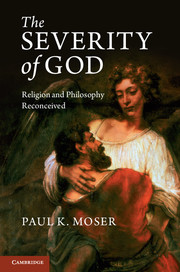Chapter Three - Severity and evidence
Published online by Cambridge University Press: 05 February 2013
Summary
I thank you, Father, Lord of heaven and earth, because you have hidden these things from the wise and the intelligent and have revealed them to infants; yes, Father, for such was your gracious will.
(Matt. 11:25–26; Luke 10:21)Our intellectual sophistication is nowadays so great that it is difficult to achieve, or to recover, that naked contact of our minds with the confronting reality out of which true wisdom alone can be born. Jesus said, “Except ye become as little children.”
(Baillie 1956, p. 141)As the Introduction suggested, many people have misguided expectations for God, that is, expectations that fail to match what would be God’s purposes, if God exists. Such expectations cloud human recognition and appropriation of the evidence for God that would be on offer. This evidence, being evidence for God, would be volitionally rigorous in a manner illustrated by the Gethsemane crisis-experience of Jesus. This chapter develops this neglected theme.
Gethsemane again
The reality of severity in human life includes the reality of deep experiential and volitional conflict in humans. In humans struggling with God, such conflict has a name and even a historical location: Gethsemane. A deficiency of religious life and thought, including in Christian and Jewish variations, is their failure to give due import to Gethsemane and its disturbing, severe God. In shunning Gethsemane and the priority of God’s will, people become world-bound and thereby obscure any distinctive evidence of God in themselves and for themselves; hence the spiritual flatness among many human, even religious communities. Indeed, we humans are experts at fleeing or otherwise avoiding the needed volitional crisis of Gethsemane.
- Type
- Chapter
- Information
- The Severity of GodReligion and Philosophy Reconceived, pp. 87 - 137Publisher: Cambridge University PressPrint publication year: 2013



